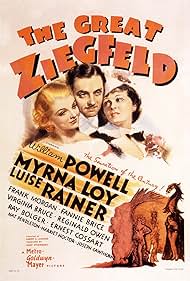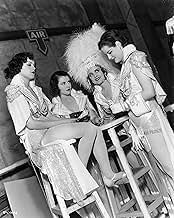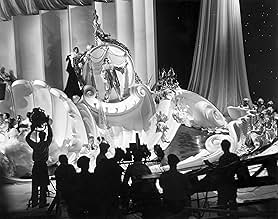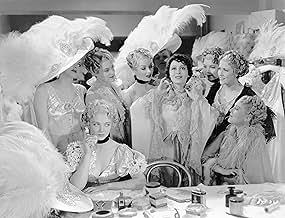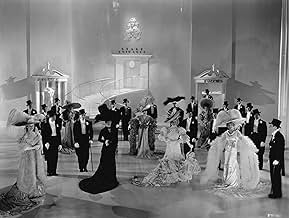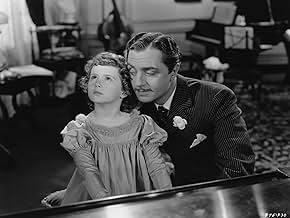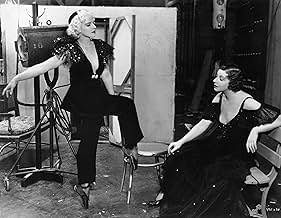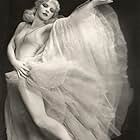The ups and downs of Florenz Ziegfeld Jr., famed producer of extravagant stage revues, are portrayed.The ups and downs of Florenz Ziegfeld Jr., famed producer of extravagant stage revues, are portrayed.The ups and downs of Florenz Ziegfeld Jr., famed producer of extravagant stage revues, are portrayed.
- Won 3 Oscars
- 4 wins & 5 nominations total
- Fannie Brice
- (as Fannie Brice)
- Dr. Ziegfeld
- (as Joseph Cawthorne)
- Director
- Writer
- All cast & crew
- Production, box office & more at IMDbPro
Best Picture Winners by Year
Best Picture Winners by Year
Storyline
Did you know
- TriviaA.A. Trimble, who portrays Will Rogers in the film, was a Cleveland map salesman who frequently impersonated Rogers at Rotarian lunches.
- GoofsIn the "Rhapsody in Blue" portion of the mammoth "Pretty Girl" number, one of the silver-fringe-and-antlers quartet of dancers gets visibly disoriented when her group does its final moves. She's the second one from the left, and her movements are completely out of sync with the other three until, with a thump, she sits down on the stairs. Since the incredibly complex number was shot in very long takes, the error was allowed to remain in the film.
- Quotes
Florenz Ziegfeld Jr.: [after catching Ray Bolger doing a little softshoe backstage] Buddy, you're better with your feet than you are with your broom.
Ray Bolger: Mr. Ziegfeld, you think so? Gee, I wish you'd give me a chance. I've got talent, and I'd like to get away from shifting scenery and moving props.
Florenz Ziegfeld Jr.: How long have you been a property boy?
Ray Bolger: Five years, but my heart hasn't been in it.
Florenz Ziegfeld Jr.: You've been working a long time without your heart, buddy.
- Crazy creditsThe opening credits display the title of the film and the names of the stars in marquee lights, as they would be on Broadway.
- Alternate versionsThere is an Italian edition of this film, as Bonus Extra, on DVD "FOLLIE DI ZIEGFELD", re-edited with the contribution of film historian Riccardo Cusin. This version is also available for streaming on some platforms.
- ConnectionsEdited into Ziegfeld Girl (1941)
- SoundtracksHarriet Hoctor Ballet
(1936) (uncredited)
(also called "A Circus Must Be Different in a Ziegfield Show")
Music by Con Conrad
Lyrics by Herb Magidson
Sung and danced by male and female choruses
Danced by Harriet Hoctor
Fast-forward to 1936, a couple of years after Ziegfeld's death, and cinema still bears his mark. Musicals (which were still often based around stage performances) were often showcases for a variety of dancing and singing talents, usually building to a spectacular finale. The Great Ziegfeld is more than just a biopic, it is the culmination of this strand in cinema; the first epic musical. Here we see the 30's musical's shimmering sets and full-on dance routines on a scale never before seen on the screen. Robert Z. Leonard directs with his usual sweeping camera moves, often slowly pulling back to reveal the size of the production. But he also lets his camera get deeply involved in the more dramatic scenes.
Apart from the various song-and-dance people involved, the casting here is very much a Hollywood affair. William Powell was then the go-to man for such smart and witty types. He and Myrna Loy were well-known as a screen couple, from The Thin Man pictures amongst others. They both give adequate portrayals, but in truth these two need a smaller, more intimate production to shine in their own right. The performance that best fits the size of The Great Ziegfeld is that of Luise Rainer. Melodramatic, full of presence, she seems always on the verge of breaking down into some farcical display of ham acting, but never quite does so. It's not a realistic performance by any stretch, but it is beautiful in its theatricality.
Ziegfeld's influence would live on in musical cinema for many years after his death. The Great Ziegfeld was just the first in a series of pictures tipping their hat to the producer. Meanwhile, many of the stars made famous by Ziegfeld – Billie Burke, Eddie Cantor, Will Rogers, Ray Bolger – were finding fruitful careers on the silver screen. It was, after all, the way of the future. You see, it wasn't just the depression that finished Ziegfeld. Even if he had lived, cinema would have provided him with too much competition to continue with his follies, especially with the advent of sound. But this is beside the point. If The Great Ziegfeld shows anything, it is that the spirit of showmanship that he championed could live on, if not in one medium then in another.
- How long is The Great Ziegfeld?Powered by Alexa
Details
- Release date
- Country of origin
- Language
- Also known as
- Der große Ziegfeld
- Filming locations
- Production company
- See more company credits at IMDbPro
- Runtime2 hours 56 minutes
- Color
- Aspect ratio
- 1.37 : 1
Contribute to this page

